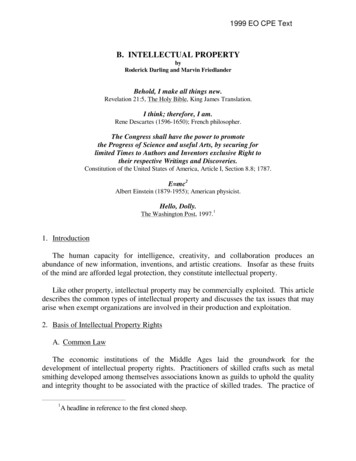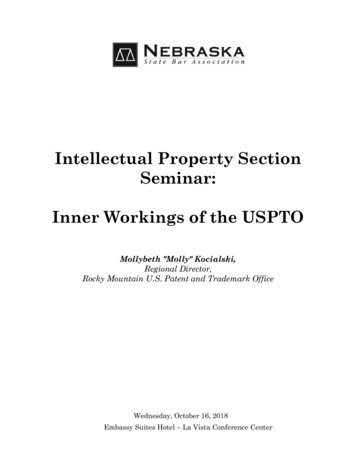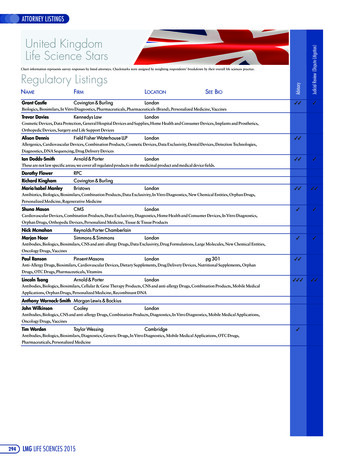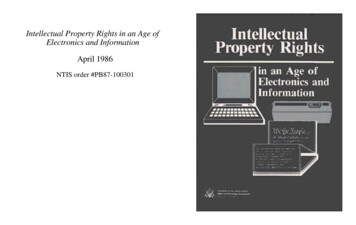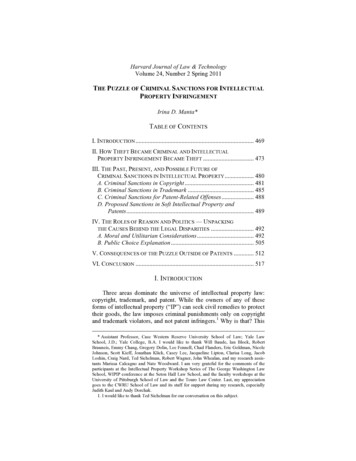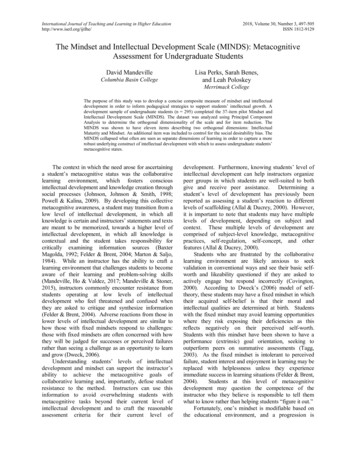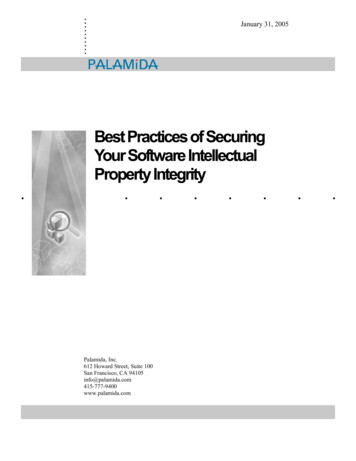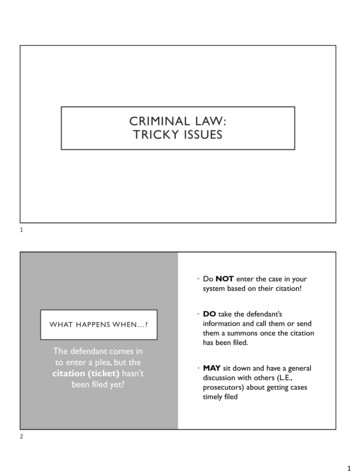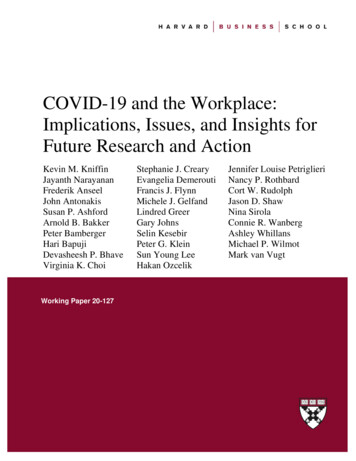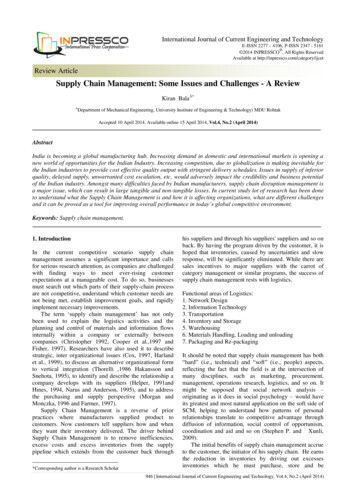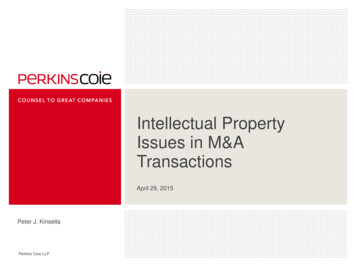
Transcription
Intellectual PropertyIssues in M&ATransactionsApril 29, 2015Peter J. KinsellaPerkins Coie LLP
Agenda IP Due Diligence IP Provisions in M&A Agreements Post-Signing / Post Closing ConsiderationsThe information provided in this presentation does notnecessarily reflect the opinions of Perkins Coie LLP, its clients oreven the author.2 Perkins Coie LLP PerkinsCoie.com
IP Due Diligence – Methodology Request and Review Information Checklist Independent Investigation Patent and Trademark Office, Library of Congress, UCCfilings Prior Art Search? Patent Clearance Search? Third Party Claims Technology / Open Source Review Interviews3 Perkins Coie LLP PerkinsCoie.com
IP Due Diligence – Purpose Purposes of IP diligence Identify the IP that is being acquired Determine ownership / clean up chain of title issues Review agreements for issues Identify infringement concerns (offensive anddefensive) Determine issues associated with and value of the IP(typically in terms of competitive advantage) Understand IP/IT/Privacy policies and procedures4 Perkins Coie LLP PerkinsCoie.com
IP Due Diligence – Identify / Value the IP Review products and services (existing and being developed) Identify product features that provide a competitive advantage Identify whether such features: Are owned by others (e.g. inbound licenses, productclearance search) Are protected by intellectual property rights Applications, registrations, contractual obligations Can be reversed engineered from a technical and legalperspective? Confidentiality and license agreements may berelevant to this analysis5 Perkins Coie LLP PerkinsCoie.com
IP Due Diligence – Patent Issues Do patents cover the features that provide a competitiveadvantage for the Seller? Strength / Scope of coverage? Validity or enforceability issues? Infringement detection? Any key omissions? Are such omissions (or other inventiondisclosures) still eligible for protection? Has relevant prior art been properly disclosed? Are maintenance and other fees paid? Are products properly marked with an appropriatepatent notice?6 Perkins Coie LLP PerkinsCoie.com
IP Diligence – Patent Ownership A patent is generally owned by the inventor, unless the inventoris obligated to assign the invention Some states impose an obligation on certain categories ofindividuals to assign inventions to an to employer. See Hewettv. Samsonite Corp. 507 P.2d 1119 Colo. App. 1973. In some instances the inventor’s employer may own anon-transferable “shop right” Are any patents co-owned? Under U.S. Law, a co-owner may: exercise rights under the patent without obligation to the otherco-owners; and assign its interest or grant licenses without accounting forprofits.7 Perkins Coie LLP PerkinsCoie.com
IP Diligence – Employee and ContractorAssignment LanguageUsing improper assignment language will not transfer rights without furtheraction Present assignment language transfers rights “will assign and do[es] hereby assign to ” Stanford v. Roche, 563 U.S.(2011) "hereby conveys, transfers and assigns" (Speedplay v. Bebob (Fed. Cir.2000)) "agrees to and does hereby grant and assign" (DBB Techs v. MLB AdvancedMedia (Fed. Cir. 2008))Promises to assign do not cause an immediate transfer “I agree to assign”. Stanford v. Roche, 563 U.S. (2011) "shall, or shall cause . . . to Transfer" (Abraxis Bioscience v. Navinta (Fed.Cir. 2010)) "will be assigned" (Arachnid v. Merit Indus. (Fed. Cir. 1991))8 Perkins Coie LLP PerkinsCoie.com
IP Due Diligence – Trademarks Federal Trademark Registrations Is the proper owner named? Prior assignments recorded? Do registrations properly cover relevant trademark classes? Have all renewals been timely and properly filed? Any pending opposition / cancellation proceedings? Do material unregistered common law marks exist? Does the trademark owner regularly police the mark? Quality Control of licensees Infringement Are proper trademark notices being used? Intent to use trademarks - must be transferred with substantially all of thebusiness to which the marks pertain9 Perkins Coie LLP PerkinsCoie.com
IP Diligence - Trade SecretsUniform Trade Secret Act (UTSA)§1(4) “‘Trade Secret’ means information, including a formula,pattern, compilation, program device, method, technique, orprocess, that: derives independent economic value, actual or potential,from not being generally known to, and not being readilyascertainable by proper means by, other persons whocan obtain economic value from its disclosure or use, and is the subject of efforts that are reasonable under thecircumstances to maintain its secrecy.”10 Perkins Coie LLP PerkinsCoie.com
IP Due Diligence – Trade Secret Issues Does Seller have procedures for identifying and protectingconfidential information? Are confidential materials properly marked? Does Seller regularly use confidentiality agreements? Who actually knows the key information? Are they going to be retained? Are they subject to noncompete agreements? Inspect documentation Is information sufficiently documented or is it important toretain knowledgeable employees?11 Perkins Coie LLP PerkinsCoie.com
IP Diligence – Copyrights See ownership issues (on next slide) Are proper copyrights notices being used? Note: complex issues involving publication dates Is the seller using any third party materials? Note: the lack of a notice doesn’t mean a work isn’tprotected12 Perkins Coie LLP PerkinsCoie.com
IP Diligence - Copyright Ownership A copyright is owned by the author, unless the work is a “work made forhire”, that is: A work prepared by an employee within the scope of heremployment; or A work specially ordered or commissioned for use as a(1) contribution to a collective work, (2) an audiovisual work, (3)translation, (4) supplementary work, (5) compilation, (6) instructionaltext, (7) test or answers to a test, (8) an atlas AND the partiesexpressly agree in writing that the work is considered a “work madefor hire.” Co-owners share profits, unless otherwise agreed in writing13 Perkins Coie LLP PerkinsCoie.com
IP Due Diligence – Confirm Ownership, Liensand other Encumbrances How was the IP developed? Consulting companies, employees, third parties? Proper agreements in place? Universities? Government funding? Use of open source software? Interfaces? Assignment records: Have assignments been recorded? Chain of title (Name Changes, Assignments, Mergers) Unrecorded conveyances Present assignment Security interests / releases (see next slide) Licenses granted to third parties14 Perkins Coie LLP PerkinsCoie.com
IP Due Diligence –Financing and Collateral Agreements Are security interests recorded? Check state UCC filings UCC Filings protect against creditors Check Patent and Trademark, Library of Congress Filings protect against Bona Fide Purchasers for value Most financing documents prohibit transfers that are out ofthe “ordinary course” of business Special triggers / conditions (e.g. escrow release uponchange of control, transfer fees etc )15 Perkins Coie LLP PerkinsCoie.com
IP Due Diligence – License Agreements -1 Inspect agreement provisions Grant Clause – is it unambiguous? Patent rights – make, use, sell, offer for sale, import? Copyright – reproduce, make derivatives work, distribute, publiclyperform, display? Trademarks – use for promotion, marketing etc. ? Trade Secret – access, use, modify ? Exclusive / Nonexclusive rightsField of Use / Geographic RestrictionsSublicense Rights?Ownership of Improvements?16 Perkins Coie LLP PerkinsCoie.com
IP Due Diligence – License Agreements -2 Term – Ability to terminate? Will consummation of the deal give rise to a terminationright? Obligations / Rights to Enforce IP Indemnity / Warranties / Limitation of Liability Note that many IP damages are consequential in nature Transferability (see next slides)17 Perkins Coie LLP PerkinsCoie.com
IP Transferability Issues -1 Patent and copyright license assignment analysis is governed byfederal common Law not state Law. Unarco v. Kelley Co., 465 F.2d 1303, 1306 ( 7th Cir. 1972). EverexSys., Inc. v. Cadtrak Corp. (In re CFLC, Inc.), 89 F.3d 673, 679 (9thCir. 1996) Cincom Systems v. Novelis Corp. (6th Cir. 2009) 581 F.3d431. There are “limited . . . situations where there is a significant conflictbetween some federal policy or interest and the use of state law” thatrequire “judicial creation of a special federal rule” of common law.O’Melveny & Myers v. Fed. Deposit Ins. Corp., 512 U.S. 79, 87 (1994).18 Perkins Coie LLP PerkinsCoie.com
IP Transferability Issues -2 Licenses are generally considered personal to thelicensee and not assignable unless expressly stated soin the agreement. Allowing the free assignability of patent and copyrightlicenses would “undermine the reward that encouragesinvention.” Id. This is because any entity desiring toacquire a license could approach either the originalinventor or one of the inventor’s licensees. CincomSystems v. Novelis Corp. (6th Cir. 2009) 581 F.3d 431.19 Perkins Coie LLP PerkinsCoie.com
IP Transferability Issues -3 Some courts have found that a patent licensee may undergo a changeof control (e.g., stock sale) without permission. InstitutPasteur v. Cambridge Biotech Corp., 104 F.3d 489, 492-94(1st. Cir. 1997), PPG Indus. v. Guardian Indus. Corp., 597 F.2d 1090, 1096 (6th Cir.),cert. denied, 444 U.S. 930, 100 S.Ct. 272, 62 L.Ed.2d 187 (1979)(distinguishing mere sale of stock from a transfer of patent license aspart of corporate merger wherein merging licensee ends its corporateexistence).20 Perkins Coie LLP PerkinsCoie.com
IP Transferability Issues -4 One court has found that a reverse merger (where the licensee survives)violated anti-assignment clauses SQL Solutions, Inc. v. Oracle Corp., 1991 WL 626458 (N.D.Cal.,December 18, 1991) holding that a software license held by thesurviving entity in a reverse triangle merger was improperlytransferred as the licensee went through a fundamental change in itsform of ownership Compare, Meso Scale Diagnostics, LLC v. Roche DiagnosticsGMBH, No. 5589-VCP (Del. Ch. Feb. 22, 2013).21 Perkins Coie LLP PerkinsCoie.com
IP Due Diligence – Trademark Licenses Grant clause should explicitly identify the licensed goods orservices Trademark owner must maintain quality control over thelicensed goods and services. See FreecycleSunnyvale v.The Freecycle Network, 626 F.3d 509 (9th Cir. 2010) Trademark owner may reserve the right to inspect andapprove the form and appearance of the mark in advertising(this is not quality control) Franchise issues?22 Perkins Coie LLP PerkinsCoie.com
IP Due Diligence –Open Source Software Licenses Is the seller using open source software (OSS)? Is the seller complying with its OSS obligations?(NOTE: different licenses have different obligations) Redistribute without charge / profit Include copyright notice of OSS code Provide or make available source code Non-enforcement of patent rights Disclaim Warranties Failure to comply with OSS license terms copyright infringement Consider having a third party audit software for OSS issues(Black Duck,Palamida, OpenLogic).23 Perkins Coie LLP PerkinsCoie.com
IP Due Diligence – Internet Issues -1 Domain Names Are important brands protected? Confirm ownership Marketing Issues Meta-Tags Key-Word buys Linking / Framing / Advertising issues E-Mail practices / Spam?24 Perkins Coie LLP PerkinsCoie.com
IP Due Diligence – Internet Issues -2 Online e-commerce issues PCI – Compliance ? Compliance with laws of other Jurisdictions Security Procedures and Audits - (e.g. SSAE 16) Back-up and disaster recovery capabilities25 Perkins Coie LLP PerkinsCoie.com
IP Due Diligence – Privacy Issues Privacy policies and procedures Are the policies and procedures followed? Does privacy policy allow the company to transferinformation to a third party in connection with a corporatetransaction? Is sensitive personal information being collected? What laws apply to the information? Numerous Federal and State Laws International Laws? Is the Seller subject to EU Privacy laws?26 Perkins Coie LLP PerkinsCoie.com
IP Due Diligence – International Issues IP rights are regulated on a country by country basis Trademark – first to file vs. First to use countries Patent filings Licenses may have significant tax implications IRS may impute income in non-arm's length transactions Local government may impose a withholding tax on royalties License may need to be registered and/or approved by the localgovernment E.g., India will not approve if royalty exceeds 10% Local government may not allow cash to leave the country Export control issues27 Perkins Coie LLP PerkinsCoie.com
IP Due Diligence –Litigation / Potential Litigation issues Does seller have written IP policies? Does seller have procedures for ensuring development workdoes not incorporate third party materials or rights? Assess risks, exposure of actual and threatened litigationagainst the seller Identify indemnification obligations to and from the seller Analyze costs associated with litigation Analyze likelihood of success Defenses / counterclaims?28 Perkins Coie LLP PerkinsCoie.com
IP Provisions in M&AAgreements29 Perkins Coie LLP PerkinsCoie.com
Exemplary Definitions -1Intellectual Property – Does the definition cover IP rightsand/or other items? “Intellectual Property” means, collectively, all Intellectual PropertyRights and Technology “Intellectual Property Rights” means collectively, any and all rights(anywhere in the world, whether statutory, common law orotherwise) with respect to . [see next slides] “Technology” means, collectively, any and all: (a) technology, .[see next slides]30 Perkins Coie LLP PerkinsCoie.com
Exemplary Definitions -2“Intellectual Property Rights” means collectively any and all rights (anywhere in the world,whether statutory, common law or otherwise) with respect to: (a) applications and registrationsfor patents, or other industrial rights or designs including any reissues, divisionals, renewals,extensions, provisionals, continuations or continuations-in-part thereof, and any other filingsclaiming priority to or serving as a basis for priority thereof (collectively “Patents”); (b)applications and registrations for copyrights or rights with respect to works of authorship(including any moral and economic rights, however denominated) (collectively “Copyrights”);(c) trademarks, service marks, certification marks, collective marks, logos and design marks,trade dress, trade names, corporate names, fictitious and other business names, or brandnames, together with all goodwill associated with any of the foregoing, and all applications,registrations and renewals therefor (collectively “Trademarks”); (d) domain names, uniformresource locators and other names and locators associated with the internet, includingapplications and registrations thereof (collectively “Domain Names”); (e) telephone numbers;(f) mask works; (g) Trade Secrets, including rights to limit the use or disclosure thereof by anyperson; (h) privacy or publicity; (i) Technology; (j) databases and data collections (collectively“Databases”); (k) all other equivalent or similar rights; and (l) any rights to pursue, recover orretain damages, costs or attorneys’ fees for past, present and future infringement ormisappropriations of the foregoing.31 Perkins Coie LLP PerkinsCoie.com
Exemplary Definitions -3“Technology” means any and all: (a) technology, compositions of matter, formulae,algorithms, procedures, processes, methods, techniques, know-how, ideas,creations, inventions, discoveries, and improvements (whether patentable orunpatentable and whether or not reduced to practice); (b) technical, engineering,manufacturing, product, marketing, servicing, financial, supplier, personnel andother information and materials; (c) customer lists, customer contact andregistration information, customer correspondence and customer purchasinghistories; (d) specifications, designs, models, devices, prototypes, schematics anddevelopment tools; (e) Software, websites, content, images, graphics, text,photographs, artwork, audiovisual works, sound recordings, graphs, drawings,reports, analyses, writings, and other works of authorship and copyrightable subjectmatter; (f) databases and other compilations and collections of data or information;(g) Trade Secrets; and (h) tangible embodiments of any of the foregoing, in anyform or media whether or not specifically listed herein.32 Perkins Coie LLP PerkinsCoie.com
Exemplary Definitions - 4 Company IP - Different ways of defining key IP means any and all Technology and any and all Intellectual PropertyRights, including Company Registered Intellectual Property, that is orare owned (in whole or in part) or purported to be owned (in whole orin part) by, exclusively licensed to or otherwise exclusively controlledby the Company. means any and all Intellectual Property exploited by, held forexploitation by, owned (in whole or in part), purported to be owned (inwhole or in part) by or licensed to the Company.33 Perkins Coie LLP PerkinsCoie.com
Exemplary Definitions - 5 Company Owned IP -- Two different approaches mean all Intellectual Property owned or purported to beowned by the Company, in whole or in part. means all Company Intellectual Property other thanIntellectual Property licensed to the Company pursuant toan Inbound License34 Perkins Coie LLP PerkinsCoie.com
Exemplary Definitions - 6 Company Registered IP means any Company Owned Intellectual Property that is the subject of anapplication or registration with any Governmental Authority. means all of the Registered IP owned by, filed in the name of, or applied forby or on behalf of, the Company Registered IP means any and all United States, foreign, national and international:(i) Patents; (ii) registered Trademarks, applications to register Trademarks,including intent to use applications, or other registrations or applications related toTrademarks; (iii) Copyrights registrations and applications to register Copyrights;(iv) Mask Work registrations and applications to register Mask Works; (v) DomainName registrations; and (vi) any other Intellectual Property Rights related theretothat are the subject of an application, certificate, filing, registration or otherdocument issued by, filed with, or recorded by (excluding any recordation of a lien,security interest or the like), any state, government or other public legal authority atany time.35 Perkins Coie LLP PerkinsCoie.com
IP Scheduling Rep -1 Intellectual property schedules that accurately identify: All IP that is owned by seller Registered Un-registered E.g., products, domain names, databases, material IP assets All IP that is exclusively licensed to the seller36 Perkins Coie LLP PerkinsCoie.com
IP Scheduling Rep -2 Schedule 1.1(a) sets forth a true and complete list of all: (i) CompanyRegistered Intellectual Property that is not expired or abandoned (ineach case enumerating specifically the applicable filing or registrationnumber, title, jurisdiction in which filing was made or from whichregistration issued, date of filing or issuance, names of all currentapplicant(s) and registered owners(s), as applicable); (ii) CompanyProducts; and (iii) any other Company Intellectual Property material tothe conduct of the Business [may explicitly call for other items such asdomain names, unregistered trademarks and other material IP].37 Perkins Coie LLP PerkinsCoie.com
Validity/Enforceability Rep Each item of Company Registered Intellectual Property that is registered is: infull force and effect; valid, subsisting and enforceable; and has been prosecutedin compliance with all applicable rules,
Trademark – first to file vs. First to use countries Patent filings Licenses may have significant tax implications IRS may impute income in non- arm's length transactions Local government may impose a withholding tax on royalties

